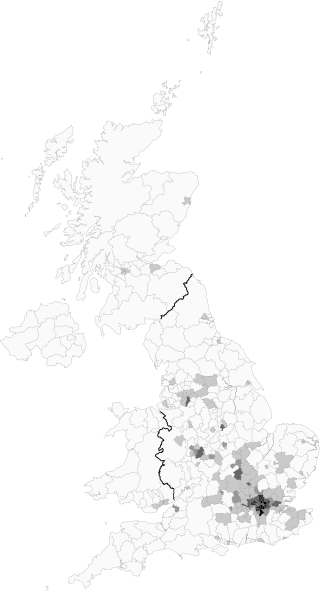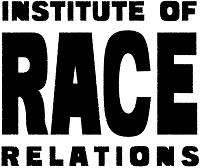Racial profiling or ethnic profiling is the act of suspecting, targeting or discriminating against a person on the basis of their ethnicity, religion, or nationality, rather than on individual suspicion or available evidence. Racial profiling involves discrimination against minority populations and often builds on negative stereotypes of the targeted demographic. Racial profiling can involve disproportionate stop searches, traffic stops, and the use of surveillance technology for facial identification.
Institutional racism, also known as systemic racism, is defined as policies and practices that exist throughout a whole society or organization that result in and support a continued unfair advantage to some people and unfair or harmful treatment of others based on race or ethnic group. It manifests as discrimination in areas such as criminal justice, employment, housing, healthcare, education and political representation.

Sir Mark Trevor Phillips is a British writer, broadcaster and former politician who served as Chair of the London Assembly from 2000 to 2001 and from 2002 to 2003. He presented Trevor Phillips on Sunday, a Sunday morning talk show on Sky News, from 2021 to 2022, and currently presents Sunday Morning on Sky News since 2023.
The Runnymede Trust is a British race equality and civil rights think tank. It was founded by Jim Rose and Anthony Lester as an independent source for generating intelligence for a multi-ethnic Britain through research, network building, leading debate and policy engagement.

Black British people are a multi-ethnic group of British people of either African or Afro-Caribbean descent. The term Black British developed in the 1950s, referring to the Black British West Indian people from the former Caribbean British colonies in the West Indies sometimes referred to as the Windrush Generation and Black British people descending from Africa.

The Institute of Race Relations (IRR) is a think tank based in the United Kingdom. It was formed in 1958 in order to publish research on race relations worldwide, and in 1972 was transformed into an "anti-racist think tank".
The relationship between race and crime in the United Kingdom is the subject of academic studies, government surveys, media coverage, and public concern. Under the Criminal Justice Act 1991, section 95, the government collects annual statistics based on race and crime.

Race relations is a sociological concept that emerged in Chicago in connection with the work of sociologist Robert E. Park and the Chicago race riot of 1919. Race relations designates a paradigm or field in sociology and a legal concept in the United Kingdom. As a sociological field, race relations attempts to explain how racial groups relate to each other. These relations vary depending on historical, social, and cultural context. The term is used in a generic way to designate race related interactions, dynamics, and issues.
Munira Mirza is a British political advisor who served as Director of the Number 10 Policy Unit under Prime Minister Boris Johnson from 2019 until she resigned in February 2022. She previously worked under Johnson as Deputy Mayor for Education and Culture when he was Mayor of London.
Societal racism is a type of racism based on a set of institutional, historical, cultural and interpersonal practices within a society that places one or more social or ethnic groups in a better position to succeed and disadvantages other groups so that disparities develop between the groups. Societal racism has also been called structural racism, because, according to Carl E. James, society is structured in a way that excludes substantial numbers of people from minority backgrounds from taking part in social institutions. Societal racism is sometimes referred to as systemic racism as well.

Racism in the United Kingdom has a long history and includes structural discrimination and hostile attitudes against various ethnic minorities. The extent and the targets have varied over time. It has resulted in cases of discrimination, riots and racially motivated murders.

Augustine John, known as Gus John, is a Grenadian-born writer, education campaigner, consultant, lecturer and researcher, who moved to the UK in 1964. He has worked in the fields of education policy, management and international development. As a social analyst he specialises in social audits, change management, policy formulation and review, and programme evaluation and development. Since the 1960s he has been active in issues of education and schooling in Britain's inner cities such as Manchester, Birmingham and London, and was the first black Director of Education and Leisure Services in Britain.

Stephen Bourne is a British writer, film and social historian specialising in Black heritage and gay culture.
Patrick Philip Vernon is a British social commentator and political activist of Jamaican heritage, who works in the voluntary and public sector. He is a former Labour councillor in the London Borough of Hackney. His career has been involved with developing and managing health and social care services, including mental health, public health, regeneration and employment projects. Also a film maker and amateur cultural historian, he runs his own social enterprise promoting the history of diverse communities, as founder of Every Generation and the "100 Great Black Britons" campaign. He is also an expert on African and Caribbean genealogy in the UK. He was appointed a Clore Fellow in 2007, an Officer of the Order of the British Empire (OBE) in the 2012 Birthday Honours for "services to the Reduction of Health Inequalities for Ethnic Minorities", and in 2018 was awarded an honorary doctorate from the University of Wolverhampton.
There have been incidents of racism in the Conservative Party since at least 1964. Conservative shadow defence minister Enoch Powell's "Rivers of Blood" speech in 1968 was both influential and widely regarded as anti-immigrant with racist overtones; the party's leader at the time, Edward Heath, condemned it, although some Conservative MPs defended Powell's speech. Since then, accusations have been made about several leading members of the party and its policies; these have related to prejudice against non-white people.

Priyamvada Gopal is an Indian-born academic, writer and public intellectual who is Professor of Postcolonial Studies at the University of Cambridge. Her primary teaching and research interests are in colonial and postcolonial studies, South Asian literature, critical race studies, and the politics and cultures of empire and globalisation. She has written three books engaging these subjects: Literary Radicalism in India (2005), The Indian English Novel (2009) and Insurgent Empire (2019). Her third book, Insurgent Empire, was shortlisted for the 2020 Nayef Al-Rodhan Prize for Global Cultural Understanding.

Cleveland Anthony Sewell, Baron Sewell of Sanderstead, is a British educational consultant and founder and chair of the educational charity Generating Genius. In July 2020, Sewell was appointed chair of the Commission on Race and Ethnic Disparities tasked with looking into race disparity in the UK. Sewell sits as a life peer in the House of Lords. He has been described as an admirer of the Black conservative scholar Thomas Sowell.

The COVID-19 pandemic has revealed race-based health care disparities in many countries, including the United States, United Kingdom, Norway, Sweden, Canada, and Singapore. These disparities are believed to originate from structural racism in these countries which pre-dates the pandemic; a commentary in The BMJ noted that "ethnoracialised differences in health outcomes have become the new normal across the world" as a result of ethnic and racial disparities in COVID-19 healthcare, determined by social factors. Data from the United States and elsewhere shows that minorities, especially black people, have been infected and killed at a disproportionate rate to white people.

Mercy Muroki is a Kenyan-British researcher, journalist, and television presenter. She was a member of the UK government's Commission on Race and Ethnic Disparities in 2021. In the same year, she began presenting on GB News, as well as writing columns for tabloid newspaper The Sun.

Mohammad Sharif Razai is a physician, poet, author and researcher. He was awarded the 2021 John Maddox Prize as an early career researcher, by Sense about Science and Nature for his work on racial health inequalities.












